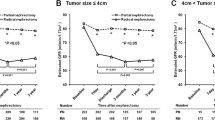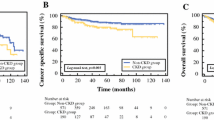Abstract
Purpose
We analyzed trends related to surgical approach for renal cell carcinoma (RCC), including partial nephrectomy (PN) or radical nephrectomy (RN), in patients with stage 4 chronic kidney disease (CKD), and identified predictors for postoperative progression to end-stage renal disease (ESRD) requiring permanent dialysis.
Methods
We enrolled patients with stage 4 CKD who underwent surgery for non-metastatic RCC. We compared their characteristics according to surgical approach (PN vs. RN). Moreover, predictors for postoperative progression to requiring permanent dialysis were determined using multivariable analyses. The Charlson comorbidity index (CCI) was adjusted for age.
Results
Fifty-one patients (PN 23, RN 28) were evaluated in the present study. Their mean preoperative estimated glomerular filtration rate (eGFR) was 24 ml/min/1.73 m2, and four patients had a solitary kidney. Three of 23 patients (13 %) who underwent PN progressed to requiring dialysis after surgery after a median 16 months. In contrast, 13 of 28 patients (46 %) who underwent RN developed dialysis immediately after surgery (median 2 days). Patients who underwent PN had lower T stages (T1, PN 100 % vs. RN 50 %, p = 0.004) and smaller tumors (31 mm vs. 65 mm, p < 0.0001) than did those who underwent RN. RN and lower preoperative eGFR significantly predicted progression to requiring dialysis, while tumor size and CCI did not.
Conclusions
PN tended to be selected for patients with lower T stage and smaller tumors in the limited cohort of stage 4 CKD patients. PN had a significant benefit of preventing dialysis in the multivariable analysis.


Similar content being viewed by others
Abbreviations
- BMI:
-
Body mass index
- CCI:
-
Charlson comorbidity index
- CKD:
-
Chronic kidney disease
- eGFR:
-
Estimated glomerular filtration rate
- ESRD:
-
End-stage renal disease
- HR:
-
Hazard ratio
- PLOS:
-
Postoperative length of stay
- PN:
-
Partial nephrectomy
- RCC:
-
Renal cell carcinoma
- RN:
-
Radical nephrectomy
References
Go AS, Chertow GM, Fan D, McCulloch CE, Hsu CY (2004) Chronic kidney disease and the risks of death, cardiovascular events, and hospitalization. N Engl J Med 351:1296–1305
Tan HJ, Norton EC, Ye Z, Hafez KS, Gore JL, Miller DC (2012) Long-term survival following partial vs radical nephrectomy among older patients with early-stage kidney cancer. JAMA 307:1629–1635
Weight CJ, Lieser G, Larson BT et al (2010) Partial nephrectomy is associated with improved overall survival compared to radical nephrectomy in patients with unanticipated benign renal tumours. Eur Urol 58:293–298
Weight CJ, Miller DC, Campbell SC, Derweesh IH, Lane BR, Messing EM (2013) The management of a clinical t1b renal tumor in the presence of a normal contralateral kidney. J Urol 189:1198–1202
Huang WC, Elkin EB, Levey AS, Jang TL, Russo P (2009) Partial nephrectomy versus radical nephrectomy in patients with small renal tumors–is there a difference in mortality and cardiovascular outcomes? J Urol 181:55–61 (discussion 61–52)
Van Poppel H, Da Pozzo L, Albrecht W et al (2011) A prospective, randomised EORTC intergroup phase 3 study comparing the oncologic outcome of elective nephron-sparing surgery and radical nephrectomy for low-stage renal cell carcinoma. Eur Urol 59:543–552
Matsuo S, Imai E, Horio M et al (2009) Revised equations for estimated GFR from serum creatinine in Japan. Am J Kidney Dis 53:982–992
Sobin LH, Compton CC (2010) TNM seventh edition: what’s new, what’s changed: communication from the International Union Against Cancer and the American Joint Committee on Cancer. Cancer 116:5336–5339
Lopez-Beltran A, Scarpelli M, Montironi R, Kirkali Z (2006) 2004 WHO classification of the renal tumors of the adults. Eur Urol 49:798–805
Scosyrev E, Messing EM, Sylvester R, Campbell S, Van Poppel H (2014) Renal function after nephron-sparing surgery versus radical nephrectomy: results from EORTC randomized trial 30904. Eur Urol 65:372–377
Kaushik D, Kim SP, Childs MA et al (2013) Overall survival and development of stage IV chronic kidney disease in patients undergoing partial and radical nephrectomy for benign renal tumors. Eur Urol 64:600–606
Yap SA, Finelli A, Urbach DR, Tomlinson GA, Alibhai SMH (2015) Partial nephrectomy for the treatment of renal cell carcinoma (RCC) and the risk of end-stage renal disease (ESRD). BJU Int 115:897–906
Lin W-Y, Liang F-W, Lu T-H (2015) Risk of end-stage renal disease after cancer nephrectomy in Taiwan: a nationwide population-based study. PLoS One 10:e0126965
Mir MC, Takagi T, Campbell RA et al (2014) Poorly functioning kidneys recover from ischemia after partial nephrectomy as well as strongly functioning kidneys. J Urol 192:665–670
Author information
Authors and Affiliations
Corresponding author
Ethics declarations
Conflict of interest
All authors have no conflict of interest.
Ethical approval
All procedures performed in studies involving human participants were in accordance with the ethical standards of the institutional and/or national research committee and with the 1964 Helsinki Declaration and its later amendments or comparable ethical standards.
IRB approval number
3748.
Informed consent
Informed consent was obtained from all individual participants included in the study.
Rights and permissions
About this article
Cite this article
Takagi, T., Kondo, T., Omae, K. et al. Comparison of progression to end-stage renal disease requiring dialysis after partial or radical nephrectomy for renal cell carcinoma in patients with severe chronic kidney disease. Int Urol Nephrol 48, 1421–1427 (2016). https://doi.org/10.1007/s11255-016-1317-9
Received:
Accepted:
Published:
Issue Date:
DOI: https://doi.org/10.1007/s11255-016-1317-9




